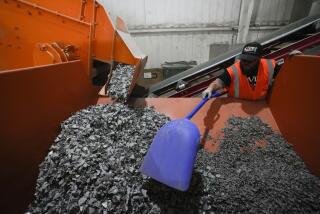IBM Finds New Profit in Recycling Old Computers
- Share via
IBM Corp. is wringing new profit from old goods by refurbishing leased computers or cannibalizing them for parts when they’re turned in.
At a hangar-like facility near Raleigh, N.C., truckloads of used personal computers, laptops and servers pour onto conveyor belts and forklifts. The swift, automated process resembles manufacturing in reverse, the aim being to extract value rather than build it in. The refurbished machines and used parts are sold on auction Web sites and to brokers.
IBM, the biggest computer maker, wants to extend the income-producing life of its products and increase its lease program’s share of total sales. IBM can offer new equipment on more attractive leasing terms because the company will squeeze more value from a device after it’s returned, said Joseph Lane, who oversees IBM’s leasing and recovery businesses.
“It would be my preference that nobody buy from us; I’d rather have them leasing,” said Lane, general manager of IBM Global Financing. “Of the hardware we move into the marketplace, we finance over one-third of it, and the percentage is growing.”
In 2001, leases increased to 35% of all hardware sales, from 30% at the end of 2000, Armonk, N.Y.-based IBM said. Global Financing’s contribution to third-quarter profit rose to 14% in 2001 from 10% a year earlier. The division produced about 4% of IBM’s sales in both periods.
The recycling business has a wider profit margin than the leasing side, Lane said. Together, the two businesses had a third-quarter gross profit margin--the percentage of sales left after deducting production costs--of 51%. Pretax income rose to $314 million from $294 million in the year-ago period.
IBM has been promoting leasing in more of its sales pitches, he added. If a potential client balks at prices for new or leased units, the company can strike a bargain on refurbished equipment to keep the customer away from rivals. The company’s Global Asset Recovery System collects an average of 10,000 pieces of leased equipment a week at recovery centers in the U.S., including Raleigh and Endicott, N.Y., as well as in Japan, France, Germany and Australia. Besides computers, the gear includes monitors, printers, data-storage devices and network routers and switches.
“They do have the capability and certainly the volume to have economies of scale,” Gartner Group Inc. analyst Frances O’Brien said.
As long as used computers can run the software required, they can be attractive to companies eager to squeeze as much as they can from their assets or those unable to make big capital expenditures. Demand is strong in Eastern Europe, for example, said Yankee Group analyst Jon Derome.
“The prices of refurbished computers are not rock bottom,” he said.
Tons of outdated computers sit idle in the U.S., and many companies store them rather than face the complex task of environmentally safe disposal, O’Brien said. IBM has “a tremendous opportunity” in recycling such equipment, she said.
Personal-computer makers Dell Computer Corp. and Compaq Computer Corp. take used units but not on the scale of IBM’s operation, O’Brien said, adding that they don’t strip units for parts.
IBM also may benefit if computer recycling becomes mandatory in the U.S., as it is in Germany, O’Brien said. Japan’s mandatory PC recycling law takes effect this year.
This month IBM plans to announce a yet-to-be-named service for recovering more used gear that was sold, not leased, Lane said. IBM can take computers on consignment so the profit can be shared with the seller, he said. IBM saves tens of millions of dollars a year by plucking used spare parts for its computers, Lane said.
IBM tries to keep the turnaround time and labor costs of refurbishing used computers low. In Raleigh, bar codes on each item and supply-chain software let IBM automate tracking. Software is used to confirm a computer’s internal configuration, erase all old data and test refurbished units.
Later in the process, “optimization” software helps IBM decide at what price to sell used machines and parts, based on market conditions and the products’ conditions.
After stripping usable parts and recycling glass, metals and plastics, IBM discards about 4% of what it collects, Lane said.
In 2000, about $100 million in sales of used goods came through IBM’s auction Web site, which is limited to screened buyers. That level probably doubled in 2001, Lane said. This month, a catalog of fixed-price items will be added to this site, he said.
Other fixed-price sales to consumers come on IBM’s open Web site, and the firm has an arrangement to auction PCs on EBay.
IBM shares closed Monday at $120.96, down $1.94 on the New York Stock Exchange.






